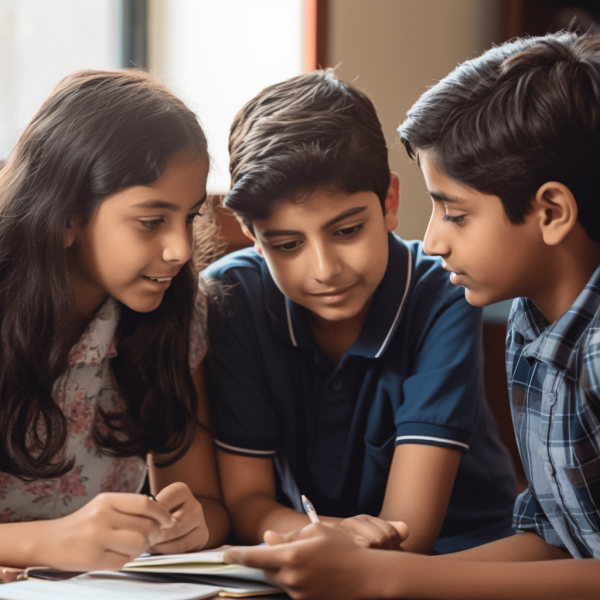
Nowadays there is a strong belief that education has to extend beyond the traditional classroom setting. Peer learning emerges as an approach that brings numerous advantages surpassing conventional teaching methods.
During our research with middle school kids, we discovered their strong inclination towards peer learning. They expressed a greater comfort in learning from their peers, preferring to discuss challenging subjects or topics with fellow students rather than their teachers or parents.
What intrigued us, even more, was their indifference towards the competitive aspect of their relationship with peers. They found it enjoyable and effortless, creating a relaxed environment conducive to learning.
Engaging with peers fosters the development of communication skills, empathy, and a deeper understanding of diverse perspectives. Kids acquire essential skills for their personal and professional lives as they learn to collaborate, respect different opinions, and build a sense of community. There is clear evidence of a correlation between peer learning and enhanced cognitive abilities.
When kids actively participate in discussions, share their thoughts, and take on the role of explaining concepts to their peers, it not only strengthens their own understanding but also allows them to explore their knowledge more deeply. By explaining and teaching, they not only reinforce their learning but also develop critical thinking and problem-solving abilities, enabling them to overcome challenges with confidence and achieve remarkable success.
Below are the well-established evidence-based impacts of peer learning
Active Engagement and Participation:
“In collaborative settings, children have the opportunity to share their ideas, contribute to discussions, and actively construct knowledge together” (Tudge & Winterhoff, 1993). Peer learning serves as a catalyst for fostering active engagement and participation among children. This dynamic involvement not only amplifies their motivation to learn but also nurtures a deep sense of ownership and responsibility towards their educational journey.
Social and Emotional Development:
Peer learning provides a platform for social and emotional development. “Interacting with peers promotes the development of communication skills, empathy, and understanding of diverse perspectives” (Kramarski & Mizrachi, 2006). Children learn to work collaboratively, respect others’ opinions, and develop a sense of community, which are valuable skills for their personal and professional lives.
Improved Cognitive Abilities:
There is clear evidence of a correlation between peer learning and enhanced cognitive abilities. When children actively engage in discussions, share their ideas, and take on the role of explaining concepts to their peers, they solidify their understanding and delve deeper into their knowledge (Vygotsky, 1978). This process of explaining and teaching not only reinforces their own learning but also cultivates their critical thinking and problem-solving skills, empowering them to tackle challenges with greater confidence and proficiency.
Enhanced Academic Achievement:
Research has consistently shown that peer learning positively impacts academic achievement. Studies indicate that collaborative learning environments lead to higher levels of achievement and retention of knowledge compared to traditional instruction (Johnson et al., 2000). Children benefit from peer feedback, diverse perspectives, and the opportunity to engage in active sense-making.
Increased Self-Confidence and Motivation:
Peer learning can boost children’s self-confidence and motivation. Working collaboratively with peers provides a supportive and non-threatening environment where children can take risks, share their ideas, and receive constructive feedback (Boud et al., 2001). This sense of belonging and positive reinforcement fuels their motivation to learn and explore new concepts.
Development of Higher-Order Thinking Skills:
Peer learning promotes the development of higher-order thinking skills. When children engage in discussions, debates, and problem-solving activities with their peers, they are challenged to think critically, analyze information, and develop creative solutions (Webb, 2009). Peer learning encourages the application of knowledge in real-world contexts, fostering deeper learning and transferable skills.
Preparation for Real-World Collaboration:
Collaboration is a crucial skill in the 21st-century workforce. Peer learning prepares children for future collaboration in professional settings by developing their interpersonal and teamwork skills (OECD, 2018). The ability to work effectively in teams, communicate ideas, and leverage diverse perspectives is highly valued in today’s interconnected world.”
We found that peer learning is a powerful approach that brings forth a multitude of advantages, contributing to the holistic development of children. Through active engagement with their peers, children not only cultivate important social skills but also enhance their cognitive abilities, leading to improved academic performance. Additionally, peer learning fosters the growth of self-confidence and equips children with invaluable collaboration skills that are vital for success in various aspects of life. By integrating peer learning strategies into educational settings, we can revolutionize the learning experience and empower children to thrive academically and in real-life situations.
- Boud, D., Cohen, R., & Sampson, J. (2001). Peer learning and assessment. Assessment & Evaluation in Higher Education, 26(4), 341-354.
- Johnson, D. W., Johnson, R. T., & Smith, K. A. (2000). Cooperative learning returns to college: What evidence is there that it works? Change: The Magazine of Higher Learning, 32(1), 10-19.